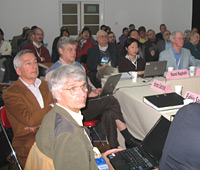 |
 |
|||||||||||||
|
|||||||||||||
|
|||||||||||||
|
The experiments will be the centre piece of the future ILC, and all the physics will revolve around them. They are being developed by sub-detector R&D and test-beam studies. The Worldwide Study (WWS) formed the Detector R&D Panel, headed by Chris Damerell, to review the activities and list missing topics. The panel has now started to hold regular reviews of the R&D projects. A dedicated committee will be formed for each sub-detector review, including external consultants, local experts, regional representatives and members of the panel. During the last ILC meeting in Beijing in February 2007, it reviewed the detector tracking systems. The ILC offers unprecedented sensitivity to new physics. The tracking system, together with the calorimeter, will be crucial to understand particle jets. ILC tracking comprises a central tracker (for which there are two candidates: a gaseous detector and silicon barrels) and a forward tracker of silicon disks. Much ongoing R&D is needed to decide which system will best satisfy the physics requirements. Detector concepts will eventually coalesce into two detector collaborations. Once the R&D results are in, it will be for the detector collaborations to choose, on the basis of performance and other factors, which tracking systems to build. "We hope that we will achieve our ambitious goal of two detectors with adequate tracking systems for physics, which demands nearly perfect reconstruction of the particles in each event,” said Damerell. This review was an opportunity to enhance coordination between the R&D groups. They hope to reach an agreement as to how to achieve their ambitious programme. At present, nobody knows how to build a tracking system that meets the needs of ILC physics. It is the task of the R&D groups to find a way, and it is the task of the R&D Panel, building on the results of this review, to help make it happen. “We really appreciate that our reviews are endorsed and supported by the Funding Agencies for Large Colliders,” said Damerell.The recommendations of this review will be presented to the chairs of the WWS Organising Committee, who will decide about wider distribution and implementation. The next detector R&D review will take place in DESY in June. This review will look at calorimeters, and will be followed by many more. “The Detector R&D Panel will transfer responsibility for reviewing R&D at the time when the groups become absorbed in detector collaborations, as happened at the Large Hadron Collider,” concluded Damerell. -- Perrine Royole-Degieux |
|||||||||||||
| © International Linear Collider |
